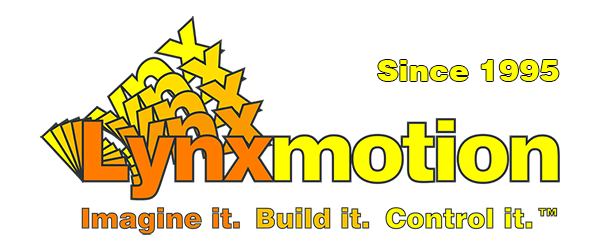Changes for page SES-V1 Servo Erector Set V1.1
Last modified by Eric Nantel on 2024/07/03 11:22
Change comment: There is no comment for this version
Summary
-
Page properties (1 modified, 0 added, 0 removed)
-
Attachments (0 modified, 0 added, 1 removed)
Details
- Page properties
-
- Content
-
... ... @@ -7,7 +7,7 @@ 7 7 {{toc/}} 8 8 9 9 |((( 10 -= Description=10 += About the Servo Erector Set V1.1 = 11 11 ))) 12 12 |((( 13 13 (% class="wikigeneratedid" id="HAbouttheServoErectorSetV1.1" %) ... ... @@ -81,9 +81,7 @@ 81 81 82 82 = User Guide = 83 83 84 -|(% colspan="2" %)((( 85 -== **Electronics Guides** == 86 -))) 84 +|(% colspan="2" %)**Electronics Guides** 87 87 |(% style="width:150px" %)[[image:BBU-01.jpg]]|[[BotBoarduino User Guide>>doc:servo-erector-set-system.ses-electronics.ses-modules.botboarduino.botboarduino-manual.WebHome]] 88 88 The BotBoarduino is intended to be used only if you plan to create code in Arduino / if you want the robot to be fully autonomous. The BotBoarduino is compatible with a variety of third party "shields". 89 89 |[[image:ssc32.jpg]]|[[SSC-32 User Guide>>doc:servo-erector-set-system.ses-electronics.ses-modules.ssc-32.ssc-32-manual.WebHome]] ... ... @@ -90,19 +90,13 @@ 90 90 The v1.1 includes the SSC-32 is an easy to use dedicated 32 servo controller. It can be connected to a computer via the DB9 connector or to the Serial to XBee breakout board. The SSC-32 can also be connected to another microcontroller via the Tx and Rx pins. The SSC-32 is not "programmable" as such - you simply send it position commands. The V1.1 does not include this part. 91 91 |[[image:SSC-32U.jpg]]|[[SSC-32U User Guide>>attach:servo-erector-set-system.ses-electronics.ses-modules.ssc-32u.WebHome@lynxmotion_ssc-32u_usb_user_guide.pdf]] 92 92 The newer S.E.S V1.2 includes the SSC-32U, which is an updated USB version of the dedicated SSC-32 servo controller. It can be connected to a computer via USB or Bluetooth Bee module. The SSC-32 can also be connected to another microcontroller via the Tx and Rx pins. The SSC-32 is not "programmable" as such - you simply send it position commands. The V1.1 does not include this part. 93 -|[[image: dfrobot-bluetooth-bee.jpg||alt="SSC-32U.jpg"]]|DFRobot Bluetooth Module User Guide (PDF)91 +|[[image:servo-erector-set-system.ses-electronics.ses-modules.botboarduino.WebHome@BBU-01.PNG]]|DFRobot Bluetooth Module User Guide (PDF) 94 94 The DFRobot Bluetooth module operates at 9600 baud (so be sure to change the jumpers on the SSC-32) and the default pairing code is 1234. The module uses the standard XBee format. Once the module has paired with the computer, the green LED located in the lower right side of the board will light up and stay solid. 95 -|[[image:RB-Tys-01.jpg]]|((( 96 -Bluetooth Bee (CSR BC417143) 97 - 98 -The Bluetooth Bee is a complete Bluetooth 2.0 module (complete with onboard antenna) whose pinout is compatible with that of an XBEE module. This module is intended to be used with the SSC-32U servo controller for wireless servo control 99 - 100 - 101 -))) 102 -|(% colspan="2" %)((( 103 -== **Assembly Guides** == 104 -))) 105 -|(% style="vertical-align:middle" %)[[image:[email protected]||alt="BBU-01.PNG"]]|((( 93 +|[[image:servo-erector-set-system.ses-electronics.ses-modules.botboarduino.WebHome@BBU-01.PNG]]| Serial to XBee Breakout Board Datasheet (PDF) 94 +The Serial to XBee breakout board is only included with the V1.1 and allows the DFRobot Bluetooth module to be connected directly to the SSC-32 board. Note that the board needs to be powered by running a pair of standard wires from the underside of the board to the SSC-32's pins (as described in the user guides). 95 +The S.E.S. V1.2 does not include this part since the SSC-32U is already XBee compatible. 96 +|(% colspan="2" %)**Assembly Guides** 97 +|[[image:[email protected]||alt="BBU-01.PNG"]]|((( 106 106 **A2WD1 (2WD) Rover** 107 107 108 108 The rover assembly guide shows how to assemble the robot using just the SSC-32 controller (for FlowBotics Studio) or using the BotBoarduino (Arduino). We suggest building and programming this robot first. ... ... @@ -109,7 +109,7 @@ 109 109 110 110 * [[doc:wheeled-tracked.2wd-rover-assembly-v1\.1.WebHome]] 111 111 ))) 112 -| (% style="vertical-align:middle" %)[[image:servo-erector-set-robots-kits.ses-v1-robots.ses-v1-arms.al5d.WebHome@al5d.jpg||alt="BBU-01.PNG"]]|(((104 +|[[image:servo-erector-set-robots-kits.ses-v1-robots.ses-v1-arms.al5d.WebHome@al5d.jpg||alt="BBU-01.PNG"]]|((( 113 113 **AL5D Robotic Arm** 114 114 115 115 The AL5D arm can be assembled using either the BotBoarduino or the SSC-32 controller. We suggest building this robot second. Note that you will need to disassemble the 2WD rover to assemble the arm. ... ... @@ -117,7 +117,7 @@ 117 117 * [[doc:servo-erector-set-robots-kits.ses-v1-robots.ses-v1-arms.arm-base-v-2-1.WebHome]] 118 118 * [[doc:servo-erector-set-robots-kits.ses-v1-robots.ses-v1-arms.al5d-arm-rev-2-1.WebHome]] 119 119 ))) 120 -| (% style="vertical-align:middle" %)[[image:servo-erector-set-robots-kits.ses-v1-robots.ses-v1-bipeds.brat.WebHome@brat.jpg||alt="BBU-01.PNG"]]|(((112 +|[[image:servo-erector-set-robots-kits.ses-v1-robots.ses-v1-bipeds.brat.WebHome@brat.jpg||alt="BBU-01.PNG"]]|((( 121 121 **BRAT Biped Robot** 122 122 123 123 The BRAT can be assembled using either the SSC-32 controller or the BotBoarduino. The BRAT uses only three servos per leg which allows for basic motion. If you are comfortable with either the Arduino code or the FlowBotics Studio code, you can try to add an additional degree of freedom to each leg. Please refer to the Arduino sample code to know which pins are connected to which servos. ... ... @@ -124,7 +124,7 @@ 124 124 125 125 * [[doc:servo-erector-set-robots-kits.ses-v1-robots.ses-v1-bipeds.brat-biped.WebHome]] 126 126 ))) 127 -| (% style="vertical-align:middle" %)[[image:servo-erector-set-robots-kits.ses-v1-robots.ses-v1-2dof-hexapods.mh2.WebHome@mh2u.jpg||alt="BBU-01.PNG"]]|(((119 +|[[image:servo-erector-set-robots-kits.ses-v1-robots.ses-v1-2dof-hexapods.mh2.WebHome@mh2u.jpg||alt="BBU-01.PNG"]]|((( 128 128 **MH2 Hexapod Robot** 129 129 130 130 The MH2 robot assembly differs slightly from the guide shown because the SES V1.1 includes 4x HS-422 servos and 8x HS-645MG servos, therefore you will need to replace two HS-422 servos with 2x HS-645MG servos. ... ... @@ -132,7 +132,7 @@ 132 132 * [[doc:servo-erector-set-robots-kits.ses-v1-robots.ses-v1-2dof-hexapods.simple-2-dof-leg.WebHome]] 133 133 * [[doc:servo-erector-set-robots-kits.ses-v1-robots.ses-v1-2dof-hexapods.mini-inline-hexapod-body.WebHome]] 134 134 ))) 135 -| (% style="vertical-align:middle" %)[[image:servo-erector-set-robots-kits.ses-v1-robots.ses-v1-quadrapods.sq3-symmetric-quad.WebHome@SQ3U.jpg||alt="BBU-01.PNG"]]|(((127 +|[[image:servo-erector-set-robots-kits.ses-v1-robots.ses-v1-quadrapods.sq3-symmetric-quad.WebHome@SQ3U.jpg||alt="BBU-01.PNG"]]|((( 136 136 **SQ3 Quadruped Robot** 137 137 138 138 The SQ3 quadruped is the most complex robot which can be built with the kit and is for users who feel comfortable with the electronics and software. ... ... @@ -140,3 +140,5 @@ 140 140 * [[doc:servo-erector-set-robots-kits.ses-v1-robots.ses-v1-3-4-dof-hexapods.3-dof-leg-v2.WebHome]] 141 141 * [[doc:servo-erector-set-robots-kits.ses-v1-robots.ses-v1-quadrapods.quadrapod-qbk-02.WebHome]] 142 142 ))) 135 + 136 +
- RB-Tys-01.jpg
-
- Author
-
... ... @@ -1,1 +1,0 @@ 1 -xwiki:XWiki.ENantel - Size
-
... ... @@ -1,1 +1,0 @@ 1 -70.0 KB - Content

